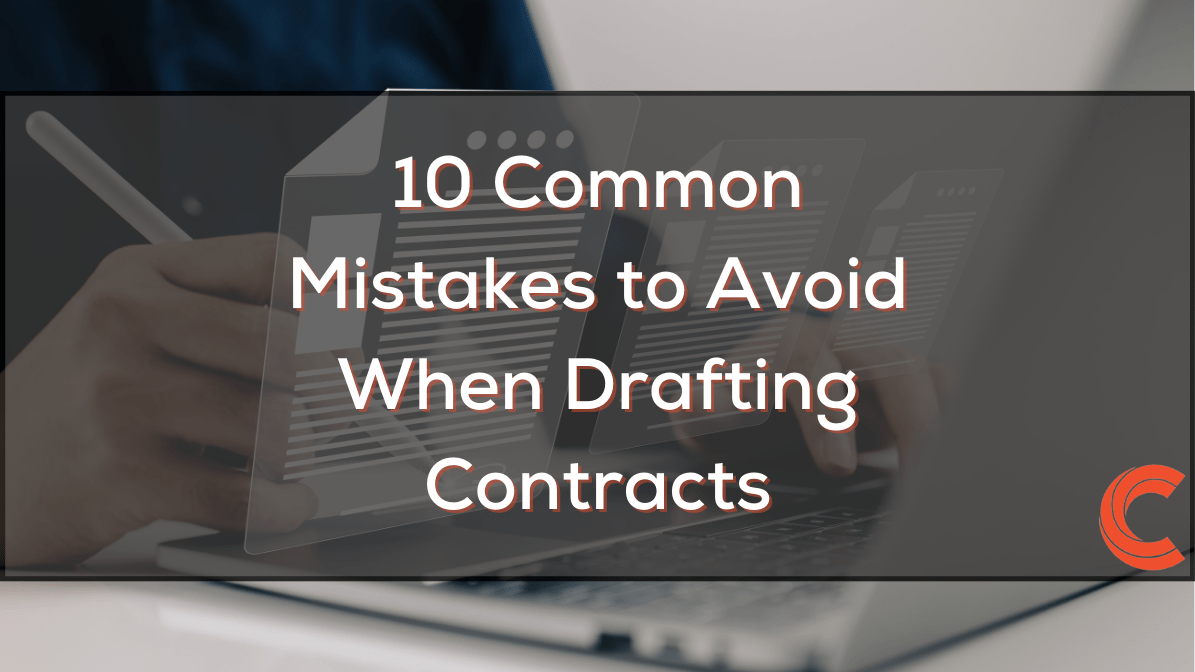Drafting contracts is a critical aspect of every business, serving as the foundation for formalizing agreements and defining the rights and obligations of the parties involved. However, the intricate nature of contract drafting can lead to errors that risk the enforceability and validity of the agreement. In this blog post, we’ll shed light on ten common mistakes to steer clear of when drafting contracts, ensuring that your agreements are legally sound and effectively protect your interests.
1. Lack of Clarity and Precision
Ambiguous Language:
- Avoid using vague or ambiguous language that could lead to differing interpretations of contractual terms. Clearly define rights, responsibilities, and obligations to reduce potential disputes.
Loose Terminology:
- Be precise in your choice of terminology and avoid using generic terms that lack specificity. Define key terms and concepts to eliminate ambiguity and ensure mutual understanding.
2. Failure to Address Essential Terms
Omission of Key Provisions:
- Ensure that your contract includes all essential terms and conditions relevant to the agreement. Failure to address critical issues such as payment terms, delivery timelines, and dispute resolution mechanisms can lead to confusion and disagreement.
Incomplete Definitions:
- Provide comprehensive definitions for terms used throughout the contract to prevent misunderstandings and disputes over interpretation.
3. Inadequate Risk Allocation
Unclear Allocation of Risk:
- Clearly outline the allocation of risk between parties, particularly concerning liability, indemnification, and warranties. Failing to address risk allocation can leave parties vulnerable to unexpected losses or liabilities.
Overly Broad Exclusion of Liability:
- Avoid including overly broad exclusion of liability clauses that may unfairly absolve one party of responsibility for foreseeable breaches or damages.
4. Ignoring Legal Formalities in Contracts
Failure to Execute Properly:
- Ensure that contracts are properly executed in accordance with legal formalities, including signature requirements and witnessing, to validate the agreement.
Non-compliance with Statutory Requirements:
- Familiarize yourself with relevant statutory requirements and ensure compliance when drafting contracts in regulated industries or jurisdictions.
5. Copying Templates Without Customization
One-Size-Fits-All Approach:
- Resist the temptation to use generic contract templates without customization to fit the specific circumstances of your agreement. Tailor contracts to address the unique needs and objectives of each transaction.
Ignoring Jurisdictional Differences:
- Consider jurisdictional nuances and legal requirements when drafting contracts across different regions or countries to ensure enforceability and compliance with local laws.
6. Failure to Anticipate Future Contingencies in Contracts
Inadequate Contingency Planning:
- Anticipate and address potential future contingencies by incorporating provisions for unforeseen events, such as force majeure clauses or termination rights, to provide flexibility and mitigate risk.
Lack of Exit Strategies:
- Include provisions outlining exit strategies or mechanisms for terminating the agreement in the event of breach, non-performance, or changes in circumstances.
7. Relying Solely on Verbal Agreements
Verbal Agreements:
- Avoid relying solely on verbal agreements or handshake deals, as they may be difficult to enforce and leave parties vulnerable to disputes over the terms of the agreement.
Memorialize Agreements in Writing:
- Always memorialize agreements in writing to provide clarity, certainty, and evidentiary support in the event of disagreements or litigation.
8. Failing to Review and Update Contracts
Failure to Review Periodically:
- Regularly review and update contracts to ensure they remain current and reflective of evolving business relationships, changing legal requirements, and market conditions.
Ignoring Changes in Circumstances:
- Assess changes in circumstances that may need modifications to existing contracts, such as changes in business operations, market conditions, or regulatory requirements.
9. Overlooking Dispute Resolution Mechanisms
Omission of Dispute Resolution Provisions:
- Include clear and enforceable dispute resolution mechanisms, such as mediation, arbitration, or litigation clauses, to provide a roadmap for solving conflicts efficiently and cost-effectively.
Failure to Specify Governing Law:
- Specify the governing law and jurisdiction for resolving disputes to avoid jurisdictional conflicts and uncertainty over applicable legal principles.
10. Neglecting Legal Counsel
DIY Contract Drafting:
- Avoid the pitfalls of DIY contract drafting and seek the guidance of experienced legal professionals, such as Carbon Law Group, to ensure that your contracts are legally enforceable and protect your interests.
Expert Contract Review:
- Entrust contract drafting and review to seasoned attorneys specializing in contract law, who can provide valuable insights, identify potential risks, and draft contracts that align with your objectives and legal requirements.
Conclusion: Drafting Contracts with Confidence
By steering clear of these common mistakes and leveraging the expertise of legal professionals like Carbon Law Group, you can draft contracts with confidence, knowing that your agreements are legally sound, enforceable, and tailored to protect your interests. Don’t let avoidable errors compromise the integrity of your contracts—take proactive steps to ensure that your agreements accurately reflect your intentions and safeguard your business relationships. For personalized assistance and expert guidance in contract drafting, contact Carbon Law Group today. Our team of experienced attorneys is here to help you navigate the complexities of contract law and achieve your business objectives seamlessly and effectively.





